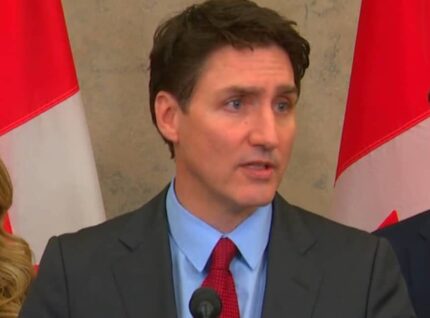The trade tensions between the United States and its North American neighbors have escalated as Canada and Mexico announced retaliatory tariffs in response to President Donald Trump’s latest round of import taxes. The U.S. has imposed a 25% tariff on goods from Canada and Mexico, alongside a 10% levy on Chinese imports, citing the need to combat the fentanyl crisis. However, Canadian Prime Minister Justin Trudeau and Mexican President Claudia Sheinbaum have condemned the move, vowing countermeasures that could mark the beginning of a global trade war.
Canada Hits Back With $155 Billion in Tariffs
In response to Trump’s sweeping tariffs, Prime Minister Justin Trudeau has unveiled a package of retaliatory measures, including a matching 25% tariff on $155 billion worth of U.S. goods. Trudeau described these actions as “far-reaching” and necessary to protect Canadian economic interests. He emphasized that Canada is not responsible for the fentanyl crisis, arguing that less than 1% of illegal drugs and migrants enter the U.S. through the northern border.
Despite Trudeau’s efforts to engage with Washington, he confirmed that he has yet to speak with Trump regarding the issue. The Canadian leader recalled his December meeting with Trump at Mar-a-Lago, where he attempted to dissuade the former president from imposing tariffs. “We don’t want to be here, we didn’t ask for this,” Trudeau stated. “But we will not back down in standing up for Canadians.” His remarks underscored the deepening rift between the two nations, which had previously enjoyed strong trade relations under the USMCA agreement.
Mexico Condemns Tariffs, Plans Own Countermeasures
Mexican President Claudia Sheinbaum has also vowed to implement retaliatory tariffs and other economic measures against the U.S., though specific details have not yet been disclosed. She dismissed Trump’s claims that Mexico is in an “intolerable alliance” with drug cartels, calling the accusation “slander” against her country. The Mexican government insists that it has been proactive in combating drug trafficking and that the new tariffs are politically motivated rather than a genuine effort to curb the fentanyl crisis.
Mexico’s economic dependence on U.S. trade makes the situation particularly volatile. Exports to the U.S. account for nearly 20% of Mexico’s GDP, and analysts warn that increased tariffs could send the country into a recession. Businesses reliant on cross-border trade are already bracing for disruptions, with experts warning of higher consumer prices and slower economic growth. The looming trade war is expected to strain Mexico’s already fragile economy, prompting concerns among investors and business leaders.
China Promises WTO Lawsuit and Retaliation
Beyond North America, China has also condemned the U.S. tariffs, calling them a “serious violation” of World Trade Organization (WTO) rules. The Chinese Ministry of Commerce released a statement expressing strong dissatisfaction and vowing to take “corresponding countermeasures.” Beijing has announced plans to file a formal complaint with the WTO while also implementing its own retaliatory tariffs on American goods.
The U.S. tariffs on Chinese imports, set at 10%, are expected to further strain relations between Washington and Beijing. China has urged the U.S. to “rectify its erroneous approach” and engage in diplomatic negotiations rather than unilateral economic measures. If tensions continue to escalate, economists predict that both nations could face prolonged economic instability, with global markets likely to suffer as supply chains are disrupted.
Experts Warn of Economic Fallout and Rising Inflation
Economists are sounding the alarm over the potential consequences of Trump’s aggressive tariff policies. Paul Ashworth of Capital Economics has warned that the trade war could have a “very destructive” impact on the economies of Canada, Mexico, and even the U.S. itself. Since exports to the U.S. make up a significant portion of both Canada’s and Mexico’s GDP, the new tariffs are expected to drive up costs for American consumers and businesses, leading to reduced demand for North American goods.
Ashworth also cautioned that higher import costs would fuel inflation, potentially derailing any plans for U.S. interest rate cuts in the near future. “The window for any more U.S. interest rate cuts over the next 12 to 18 months just slammed shut,” he said. Higher borrowing costs could weaken consumer purchasing power, slow down business investments, and increase financial strain on governments and institutions that rely on U.S. dollar loans. The escalating trade conflict could ultimately have far-reaching consequences, not just for North America but for the global economy as a whole.
As tensions continue to mount, the coming weeks will be crucial in determining whether diplomatic negotiations can prevent an all-out trade war. For now, however, Canada, Mexico, and China are all preparing to retaliate against the U.S., setting the stage for an economic showdown with unpredictable consequences.














